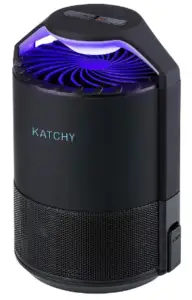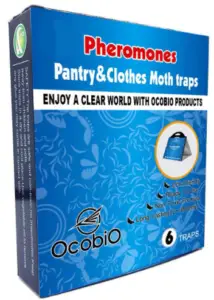Do you live in a home with pantry moths? We’ve got you covered, so don’t worry! These naughty little critters can be difficult to see, like nothing more than munching on your favorite foods and leaving an unpleasant odor in their wake. But don’t panic; there are solutions to eliminate them permanently. Although chilling can sometimes help kill off moths, it’s not always the best option. So please don’t allow these bugs to destroy your pantry; read on to discover some efficient ways to get rid of them for good! But first, will freezing kill pantry moths?
Yes, when you freeze food for an extended period, it’s not just about getting rid of the heat to keep that food safe; it is also about getting rid of any microorganisms living there already. As such, freezing doesn’t always kill pantry moths instantly.
Therefore, we’ll focus on the essential methods for eliminating them and keeping them from returning.
Pantry moths are a household nightmare and an easily overlooked problem. Freezing the infestation is the most popular method of eliminating pantry moths. But you may still wonder how long pantry moth eggs can survive in a freezer.
Unfortunately, keeping your food cold in the fridge or freezer will kill entire lifecycles at a time, but it probably won’t eliminate them instantly. When you freeze food for an extended period, it’s not just about getting rid of the heat to keep that food safe; it is also about getting rid of any microorganisms living there already. As such, freezing doesn’t always kill pantry moths instantly.
Because of this, it’s not recommended that you freeze all of your food at once. Instead, you should try to freeze your food in smaller portions and wait for it to defrost. If you do this correctly, you shouldn’t have any problems with returning bugs.
Hopefully, these tips will help you understand how to eliminate pantry moths and keep them from returning.
Once you find a moth infestation in your home, it can be vital to eliminate it as quickly as possible. Unfortunately, moths are extremely difficult to spot, making it easier for them to spread throughout your house. This isn’t only annoying and gross but could lead to a severe health hazard if left untreated.
If you’re worried about having a pantry moth problem in your home, then knowing how to get rid of moth larvae and adults may be an essential first step. To get started, we’ll discuss the most common types of moths in your home and how you can eliminate them.
What are pantry moths?
Commonly in the United States, a meal moth known as a pantry moth can be seen in food storage areas. Pantry moths are sometimes known as Indian meal moths. These moths are distinct from others since they feed on goods kept in the pantry or cabinet.
While pantry moths are likely the most common species in food storage cabinets, they aren’t all that dangerous. Even though they are known for being a nuisance and causing a stench, they don’t threaten your health. Knowing how to eliminate pantry moth larvae is crucial for later eradication.
These moths are very similar to the clothes moth, so it isn’t easy to distinguish between them. However, when reading about pantry moth treatment, you may stumble upon remarks about clothes moths. Research the two species if you find yourself perplexed by the distinctions.
How do pantry moths get into my house?
Pantry moth larvae are typically found in your kitchen and food storage cabinets. This is where they get their name and thrive in all areas of your home. Moths can be highly annoying for several reasons. As soon as you find that your spices and other food items are becoming infested, it’s time to take action.
How to get rid of pantry moths naturally?
If you’re looking for a natural way to kill pantry moth larvae, you may consider hiring an exterminator. While it can be challenging to get rid of these pests on your own, there are a few methods that can be effective. However, before treating the infested area, you’ll probably want to ensure that it’s an issue with moths and not some other problem. They can wreak havoc in your kitchen and food storage areas if left untreated.
Once you’ve determined that there is indeed an infestation of pantry moths, it might be time to take action. After you’ve removed all your contaminated foods from the cabinets, you can begin to eliminate the problem. Check out the following methods for starting your pantry moth treatment:
- Ensuring your home is spotless will eliminate any chance of moths.
- An excellent way to begin cleaning up is by scrubbing everything down with soap and water. This will ensure that all of the surfaces in your home are deeply cleaned and ready for use.
- Those on a tight budget can read up on this easy-to-make pantry moth trap. This is a cheap and straightforward method for getting rid of moths.
If you’re looking for even cheaper ways to get rid of the pests, then consider the following options:
Pantry moth traps.
These traps are usually placed in your food storage cabinets or other infested areas. They are often made from cardboard or plastic and trap the adult moths directly. These traps have been proven to be highly effective as long as you keep them clean. Consider it if you want a cheaper alternative to DIY pantry moth traps.
If you’re struggling to eliminate the pests, you may want to invest in an Ocobio powerful 2-in-1 pantry and clothes moth trap. This trap will work by trapping the moths and preventing them from laying their eggs. These traps are very effective at stopping the cycle in your home, but they can be a little more costly than other options.
If your infestation gets out of hand, it’s time to take action. But, before you begin your pantry moth treatment, you must know everything about these pests.
Read Also: Everything about pantry moths.
The infestation of pantry moths can be highly damaging. Because they’re so prevalent and enticing to moths, they may enter your home if you’re not careful. Once you find an infestation, act quickly.
Pantry moths can be very persistent and annoying pests. The problem with these pests is that they continue to multiply rapidly and eliminate everything in their path if they aren’t dealt with immediately.
Unfortunately, you may overlook the issue until it’s too late or until there are already a few adult pantry moths flying around your home. Therefore, eliminating pantry moths is essential to avoid future difficulties.
Many have difficulty understanding how to eliminate pantry moth larvae and adult moths without chemicals. But unfortunately, there’s no natural way to kill pests without insecticides or pesticides. To avoid chemicals, learn how to kill pantry moth larvae with vinegar.
While you must understand the process of getting rid of pantry moth larvae, it’s also essential to examine your home for signs that there are already moths. Once you notice an issue, you can immediately take action and prevent more from coming in from outside your home.
Can pantry moths’ eggs survive in cold temperatures?
If the pantry moth eggs are exposed to cold temperatures, they will die. However, humans can use this technique confidently because freezing has no negative impact on food quality.
Does freezing kill clothes moth larvae?
If done correctly, freezing will kill both the larvae and eggs of the clothes moth. Therefore, it is the cheapest way to deal with such a clothes moth infestation at first, but keep in mind that now the larvae and eggs will still be there. Because of this, you might want to launder the clothes again to get rid of them.
Conclusion
If you’re searching for a natural way to get rid of pantry moths, you may consider using essential oils. Several essential oil recipes have been known to kill pantry moth larvae and can eliminate existing infestations in your home.
If you’re experiencing an infestation of pantry moths, you must start taking action immediately. First, of course, you must understand the problem, but it’s also essential that you can identify the spots where your food is being stored in your home. If all of your food is adequately placed, then there shouldn’t be an issue with a pest issue like these moths.
There’s no doubt that you must understand what you’re dealing with regarding these pests. However, by learning everything about the issue, it should be much easier for you to take action and eliminate pantry moths in a way that won’t harm your health or the environment.
Because so many pests can infest and taint food, you must learn about pantry moths before taking action. Getting rid of a nuisance may be more challenging if you don’t know what it is.
There’s one place to learn about pantry moths: Wikipedia.



